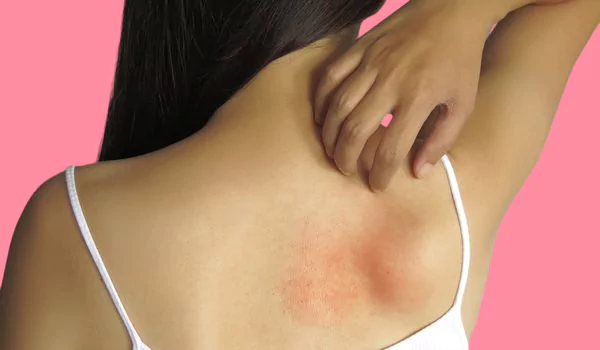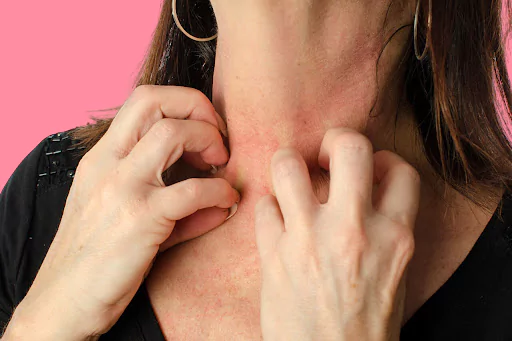Urticaria is a bothersome skin condition that affects many women. It appears as raised red spots or blisters that cause intense itching.
The severity of the condition varies from mild and temporary to chronic, lasting for weeks or months, affecting a woman's quality of life and self-confidence.
What is urticaria?
Urticaria is an allergic reaction that occurs when the body releases histamine in response to a specific stimulus, leading to dilation of the blood vessels in the skin and the appearance of a rash or temporary swelling.
The condition may last for a few hours or days, and sometimes it develops into a chronic form that recurs periodically.
What are the causes of urticaria in women?
The causes of urticaria are numerous and vary from one woman to another. The most important include:
- Allergy to certain foods.
- Medications such as antibiotics or painkillers.
- Psychological stress and tension.
- Hormonal changes.
- Infection or chronic diseases.
- Environmental factors.
- Perfumes and cosmetics.
What are the symptoms of urticaria in women?

Symptoms appear suddenly and may include:
- Red or pink spots or bumps on the skin.
- Severe itching, which may worsen at night.
- Swelling of the lips or eyelids, sometimes.
- A burning or tingling sensation in the skin.
- Symptoms may disappear and recur frequently without a clear cause.
Types of urticaria
Urticaria appears in several forms, varying in duration and cause. The most prominent types are:
- Acute urticaria: Lasts from hours to weeks and disappears after the cause is removed.
- Chronic urticaria: Lasts for more than 6 weeks and requires close medical follow-up.
- Physical urticaria: Appears after exposure to factors such as pressure, heat, or water.
What are the treatments for urticaria in women?
Treatment depends on identifying the cause and relieving symptoms, and includes:
- Avoiding triggers.
- Using antihistamines.
- Using corticosteroids.
- Modern biological therapies.
- Using topical moisturizers.
- Lifestyle modifications.
Home remedies to soothe urticaria

- Apply cold compresses to reduce itching.
- Use aloe vera or natural oatmeal creams.
- Avoid hot water and tight clothing.
- Drink plenty of water to keep your skin hydrated.
When should you see a doctor?
You should see a doctor immediately if:
- You experience difficulty breathing or swelling of the tongue or throat.
- The symptoms do not improve despite treatment.
- The condition persists for more than 6 weeks or is recurrent.
Is urticaria contagious?
No, urticaria is not contagious because it is caused by an immune reaction, not an infection.
Can urticaria go away without treatment?
In mild cases, yes, it may go away within hours or days, but chronic cases require treatment and follow-up.
Does stress cause urticaria?
Yes, psychological stress is one of the factors that stimulates the immune system and increases the likelihood of symptoms appearing.
Article Summary
Urticaria in women occurs as a result of an immune response to triggers such as foods, medications, or stress.
Symptoms include itching and red, itchy patches, which can be controlled by avoiding triggers and using antihistamines or appropriate topical treatments.
In chronic cases, a doctor should be consulted to determine the best treatment and ensure relief and control of symptoms.